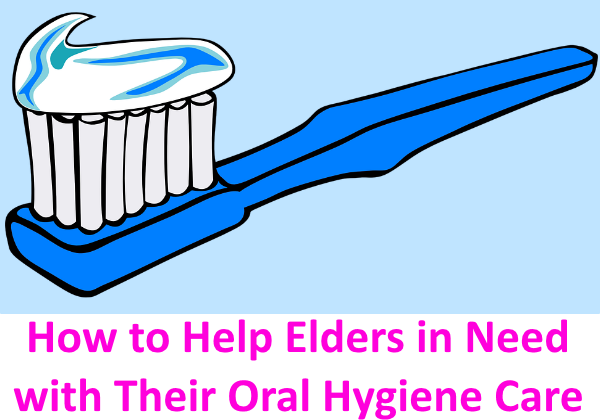Contributing Writer: Mary Jensen, Registered Dental Hygienist

Can you imagine not being able to brush your own teeth?
Let’s pretend this everyday activity, that you have done your entire life, is now beyond your capabilities. Perhaps it is due to arthritis, poor vision, or dementia.
Your inability to perform routine and effective oral hygiene care leads to dental decay and likely periodontal (gum) disease.
It can also contribute to an increased risk of heart disease, stroke, and aspiration pneumonia. Controlling your diabetes will also be more difficult.
Unfortunately, this is what happens to many seniors. Especially those with dementia.
Oral hygiene care is more than routine grooming like brushing one’s hair, or shaving—it is infection control!
Inflammation of the gums, due to lack of care, will negatively affect overall health. One thing that is known for sure, the mouth is connected to the body and the body is connected to the mouth.
The blood in the infected gum tissue is the same blood that is traveling to the heart. The body reacts to infection — wherever it may be located.
Many seniors have had the benefit of preventative dental care. They have their natural teeth! Who will take the responsibility for caring for them when they can no longer care for themselves?
This responsibility falls on the family or caregiver. But how can they can provide such care?
If it has been some time since they last received good oral care, start with a comprehensive dental exam by a dentist.
When cognitive decline is the issue, the earlier the visit the better and possibly easier for the individual.
Related TinT Resource:
Helping Someone with Alzheimer’s Dress & Groom
Basic steps can be taken to assist and encourage oral hygiene care.
ORAL CARE AT HOME
Be prepared. Set up the toothbrush with a thin layer of toothpaste in the bathroom.
Have a cup of water ready to rinse (if rinsing is not possible, use a thin layer of infant toothpaste gel—it is safe to swallow).
Have the individual stand (if possible) or sit at the sink.
Hand the toothbrush to the individual and ask them to brush.
If this is not possible, place the toothbrush in their dominant hand and have your hand over theirs and gently brush together.
The use of dental floss or another between-the-teeth cleaner is very important. Ask your dental professional (dentist or dental hygienist) what might work best.
ORAL CARE IN MEMORY CARE OR ASSISTED LIVING
Ask who is providing oral hygiene care (brushing and between-the-teeth oral hygiene care) and how often. Once a day? Twice a day? What training did the caregiver receive?
How is your loved one responding to this oral care? Are they cooperative? What steps are being taken to make it successful?
I am a registered dental hygienist and part of the HyLife Oral Health Alliance. We provide weekly oral hygiene care to seniors in assisted living, memory care, or long term care communities.
We use 100% xylitol sweetened products. Xylitol is plant sourced and it does not promote tooth decay. The senior is supplied with toothpaste as well as a daily protocol of xylitol mints or gum.
This proven program helps reduce bacterial plaque and decreases dry mouth. Xylitol is a natural sweetener and doesn’t interfere with blood sugar levels. This makes it a safe choice for those on a sugar controlled diet.
One of the main reason seniors are hospitalized is aspiration pneumonia (AP). AP is the inflammation of the lungs caused by breathing in foreign material.
Where is that material coming from to set up shop in the lungs? The mouth!
Hospitalization and a course of antibiotics may be needed. AP can be a serious life threatening disease that can lead to respiratory failure.
A clean mouth will decrease the amount of bacteria and food debris thus reducing the risk of AP and other health issues.
 About the Author: Mary Jensen is a Registered Dental Hygienist with over 35 years experience.
About the Author: Mary Jensen is a Registered Dental Hygienist with over 35 years experience.
Her passion is helping dependent seniors with oral hygiene care. She is an advocate for the care team and provides in-service educational presentations to CNAs, caregivers and senior groups.
She is also part of the HyLife Oral Health Alliance, where they provide weekly oral hygiene care to seniors in assisted living, memory care, or long term care communities; bringing oral care to elder care.
HyLife,LLC puts hygienists in the position where they are most needed. Please reach out to them with any questions: www.hylifellc.com or maryjensenrdh@gmail.com.
If you like what you’ve read, why not receive periodic updates when you:
Subscribe to the TinT Newsletter
Do you have a loved one or client who is dependent on others for oral hygiene care? Please share your experience or tips/strategies in the comments below:





This is really a great, most helpful post. I’m going to look for Xylitol toothpaste for myself also!
Mike and Together in This offers so much help for caring for persons with dementia. And he is not monetizing his information, though he certainly could. I consider him an angel of ‘Good’ works and am very grateful for the many tips I get from his website and newsletters.
I’m very happy you like the post, and I really appreciate your very kind words and gratitude – it means the world to me 🙂
Nice tips dear. Thanks for sharing it.. I get lot’s of beautiful tips clip in dental care
When the occupational therapist came in to see if my mother could stay home after being in the hospital and she checked to see how Mom bathed, I asked if Mom had brushed her teeth. The OT said no. My mother had a tendency to bite and I didn’t know what to do. When I took her to the dentist, she had four teeth which needed to be extracted as they had serious tooth decay. She had always taken such good care of her teeth. I didn’t realize she had stopped.